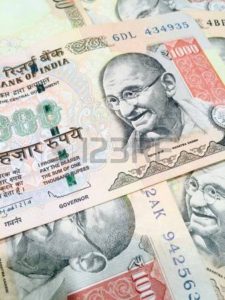Small Change, Big Change
 Whilst people scrambled to bank ATMs minutes after our Prime Minister’s announcement about demonetization and the carefully framed narrative that followed, for me it was a bit of a waiting game. I thought I was smarter than the rest. I had my credit cards and debit cards on me and some 100 rupee notes that had just been withdrawn a few days back before the much touted surgical strike on black money happened. I informed my maid and cook rather nonchalantly that their salary would be delayed and they manage the ‘small’ inconvenience for the larger national good. It was just a waiting game one reckoned; that they continue d to wait until I got in the ATM queue but it was their problem, of course. Exactly like the waiting game that Geeta and Abdul talk about – but more about them a bit later.
Whilst people scrambled to bank ATMs minutes after our Prime Minister’s announcement about demonetization and the carefully framed narrative that followed, for me it was a bit of a waiting game. I thought I was smarter than the rest. I had my credit cards and debit cards on me and some 100 rupee notes that had just been withdrawn a few days back before the much touted surgical strike on black money happened. I informed my maid and cook rather nonchalantly that their salary would be delayed and they manage the ‘small’ inconvenience for the larger national good. It was just a waiting game one reckoned; that they continue d to wait until I got in the ATM queue but it was their problem, of course. Exactly like the waiting game that Geeta and Abdul talk about – but more about them a bit later.
Whilst every time I drove down to work and back, one looked on at the poor unfortunate souls who were standing in the queues waiting for their hard earned money to come back via ATMs to them like some distorted theory of karma, spouting through the metallic orifices that dispense this cash. One glance though at the queues portrayed a myriad of backgrounds – housewives, executives, young software engineers, small time shopkeepers, students, senior citizens and a motley crowd of what is a snapshot of our typical street microcosm. The banks’ vehicle parking spaces spelled chaos also indicated crazy parking so characteristic of us Indians- haphazard two wheelers on footpaths and strewn all over in the bye lanes next to the ATMs.
Try hard as much one could, I couldn’t fathom in those queues nor in the modes of transport they came in, any ‘typical’ black money hoarders who flaunt their stinking mostly ill -gotten wealth at grandiose family weddings and birthday parties in glittering solitaires, Gucci’s and Versace’s. None in the queues seemed to look like the typical, gaunt black money hoarders one imagines and none came in in big SUVs. They looked like ordinary hassled men and women in two wheelers or public transport attired in what looked like middle class, lower middle class clothes. No politicians in starched white jabba kurta in the queues, no billion-dollar conglomerate promoters lining up for Rs 2000 per day cash limit, no fancy cars and no bulging sacks of black money. Just plain, ordinary, harried mostly tax paying middle class, lower middle class citizens soaked in sweat and dunked generously in a sense of manufactured faux altruism.
As one sees how small businesses are being affected by this decision with small ticket cash transactions trickling like much of the water in our municipal pipes, one can ’t help and wonder how the poor – are both urban and rural are coping up with this drama. Much of ‘below the radar’ small time businesses operate in cash as it is the same government policies that do not allow them to access capital from the formal banking system. Imagine a poor subzi wala or a kabadiwala going to the bank manager in any bank to ask for a loan and the sort of treatment that is meted out to him. No wonder that in this country of traditional micro entrepreneurs (much before the venture funded cash burning start-ups became fashionable), there is a parallel system of money market that’s operates with money lenders charging exorbitant rates and micro entrepreneurs eking out their living, sidestepping the formal system that ignores them, rubbishes them, abuses them and discards them. And this is simply because the formal system refuses to acknowledge these micro entrepreneurs for the value they get to the economy and society at large.
My current work engaging with small time entrepreneurs’ gives me a rare, deliberate proximity with the class of people that most people would shun to associate with. And when I mean most people, I don’t mean just the grand wedding – SUV class, yacht hopping burgundy class but even the class that makes up for a large part of the hoi polloi that are current ly standing in the ATM queues. Why so? Because many of the people I work with now, are waste workers, rag pickers and mostly Dalit’s who are shunned for their caste, class and socio economic lineage. It a different matter that they keep our streets clean by scavenging (unlike the mostly defunct municipal bodies whose job it is in the first place) by picking up what we wantonly throw from our car windows and classy apartments garbage bins – fed daily by this frenzy called e -commerce and the hyper steroid packaging they generate.
Geeta (name changed) is an entrepreneur in Bangalore who lends lights on rent to the street vendors, vegetable sellers, etc. She makes a business transaction of approximately Rs. 1000 per day, all dealt in cash on a daily basis. On demonetization of Rs.500 and Rs.1000 Notes, she shares that it is has affected her business transactions for each day ever since because of the scarcity of smaller denominations for exchange. She also adds that it is a good step as people holding huge amount of cash in form of black money will have to come out. Does she have black money? Of course not – she has barely enough money to send her small kids to school and run her meagre household. So, the propaganda seems to be working. Another entrepreneur, Abdul (name changed) had a different version on the seminal move by the government. He narrates that even though his business is not much affected by the move because he has a monthly payment cycle with his clients. However, the personal lives and transactions for daily necessities are the worst affected. He adds t hat even when they have money, they do not have food because of the unavailability of smaller denominations; people are managing from the neighbours for food and other things. Also, some households around him do have bank accounts and even debit cards but they have hardly ever used it, unlike the middle class and neo middle class who are resorting to make cashless transactions to avoid pain through this transition.
Real inclusive growth would mean that all sections of society benefits from the overall economic prosperity. A primary metric for inclusion is financial inclusion (i.e. the access to basic financial services and affordable financial products such as loans, basic accounts and deposits for all individuals and small businesses). When the really poor have access to credit facilities, this translates to their financial security. The smarter and resilient amongst them can potentially grow their businesses, manage their own finances better and plan for the future. They become self–sufficient and not dependent on the state’s largesse or doles and contribute more to the GDP as well.
Don’t get me wrong. I am for eliminating black money. This country desperately needs it. But the means are as important as the end. If the Geeta’s and the Abdul’s of the world turns upside down to manage this disruption, whilst a certain bunch still makes merry at Mt. Titlis, maybe it is time do some deep thinking. As for me, I am more humble than smarter for now.


